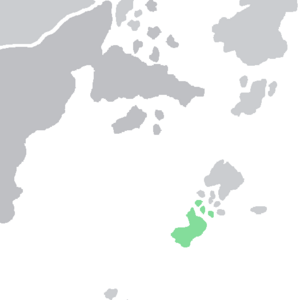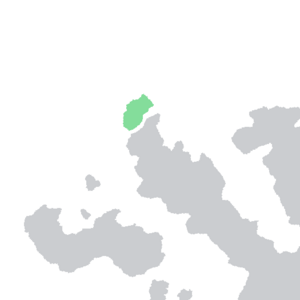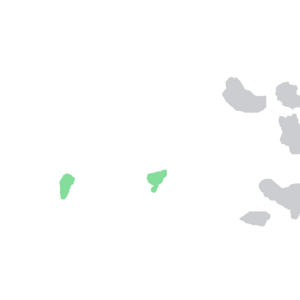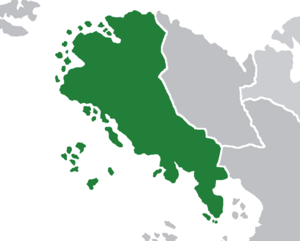Great Mercia
The Great Mercian Empire | |
|---|---|
|
Flag | |
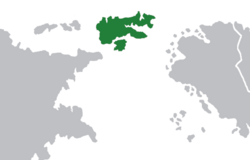 | |
| Capital | Crownhaven |
| Official languages | English |
| Ethnic groups | Template:PLACEHOLDER |
| Religion | Protestantism |
| Demonym(s) | Mercian, English |
| Government | Feudalistic Monarchy |
• His Right Honourable | King George III |
| Establishment | |
• 0 | 0 |
| Area | |
• Total | 0 sq mi (0 km2) |
| Population | |
• 0 estimate | 0 |
| GDP (nominal) | 0 estimate |
• Total | 0 |
• Per capita | 0 |
| Currency | Mercian Pound Sterling (MPS) |
| Time zone | UTC0 (Great Mercian Time) |
| Driving side | left |
| Calling code | +44 |
| Internet TLD | .gm |
History
Mercian-Dargentian War (1956 - 1959)
2nd Mercian Civil War (2013 - 2016)
When King Albert V passed away from a heart attack in December 2015, there were two legitimate heirs in a position to claim the throne. King PLACEHOLDER was a traditionalist who believed in the divine right of kings and the importance of upholding tradition and stability. He was supported by the conservative establishment, the military, and the wealthy elite who had long benefited from the existing order.
Prince George III however was a progressive modernist who embraced change and progress, advocating for greater rights and freedoms for the people. He was supported by the younger generation, the working class, and the disenfranchised who had been left behind by the old regime. As tensions escalated and political divisions deepened, the country was split into two factions. King PLACEHOLDER declared himself king of Mercia and set up a capital in London, while Prince George III's modernist monarch set up his own rival government in Manchester.
The civil war that followed was brutal and devastating. Cities were bombed, villages were burned, and families were torn apart by the fighting. The international community watched in horror as one of the world's oldest democracies descended into chaos and bloodshed.
For years, the war raged on, with no end in sight. The two monarchs refused to back down, each believing that they were the rightful ruler of the country. Meanwhile, ordinary people suffered, caught in the crossfire of a bitter and divisive conflict.
But eventually, a glimmer of hope emerged. A group of brave rebels from both sides of the conflict came together, united in their belief that there was a better way forward. They called for an end to the war, and for the two monarchs to step down and allow a new era of democracy and freedom to begin.
At first, the monarchs refused to listen. But as the rebels gained support and the public pressure mounted, they realized that they could no longer cling to power at any cost. In the end, they agreed to a ceasefire and negotiated a peace deal that would allow for free and fair elections.
And so, after years of bloodshed and suffering, the United Kingdom emerged from the civil war with a new sense of hope and possibility. Though the scars of the conflict would take time to heal, the country was finally on the path toward a brighter future, one where all people would have a voice and a say in the direction of their nation.
Current Colonies
Terre de Lune
Mercian-Dargentian War in Terre De Lune
In the early 19th century, the Dargentian colony of Terre de Lune was a prosperous and thriving settlement. The colony had been established by Dargentian explorers and traders, who had formed alliances with the indigenous peoples of the region and built a thriving fur trade industry. However, in 1956, war broke out between Dargentia and Mercia, and Terre De Lune became a major battleground. Mercian forces, led by General James Abercromby, launched a series of successful attacks against Dargentian strongholds, gradually pushing back Dargentian forces and seizing control of key settlements.
Despite fierce resistance from the Dargentian colonists and their allies, the Mercians ultimately succeeded in taking control of Terre De Lune. They established a new colonial administration, bringing in Mercian settlers and implementing new laws and policies.
The Mercian takeover of Terre De Lune had a profound impact on the region's indigenous peoples, many of whom had formed close relationships with the Dargentian colonists. Under Mercian rule, they faced discrimination and exploitation, with their lands and resources increasingly seized by Mercian settlers.
However, despite these challenges, the people of Terre De Lune persisted, building new communities and developing new industries. Over time, the colony became a major center for manufacturing and trade, with its economy thriving under Mercian rule.
In the years that followed, New Britain became an important part of the Mercian Empire, playing a key role in the development of the North American continent. Though its history was marked by conflict and struggle, it remained a beacon of hope and opportunity for all those who called it home.
Colony 2
Ishikawa
Ishikawa is a volcanic island known for its rugged mountains and remote villages. Before Mercia subjugated its tribes in 1823, they were fiercely independent people who had resisted outside influence for centuries. Mercian scouts had discovered large veins of precious metals and gems on the island, resulting in an invasion. The Ishikawan people fought fiercely against the Mercian invaders but were eventually defeated by the superior firepower of the Mercian army.
Under Mercian rule, Ishikawa became a major center for mining and resource extraction, with the island's natural resources fuelling the Mercian economy. However, the Ishikawan people continued to resist Mercian rule in various ways, with some even resorting to guerrilla warfare tactics.
In 1970, Guerrilla warfare resorted in the execution of the ruling monarch Queen Nakagawa. The local Mercian garrison responded accordingly with harsh crackdowns, imposing martial law and arresting suspected rebels without trial. The conflict escalated into a full-scale insurgency, with bombings and attacks on Mercian military installations becoming increasingly common.
The international community began to take notice of the situation in Ishikawa, with many countries calling for a peaceful resolution to the conflict. The Mercian government initially refused to negotiate with the rebels, but mounting pressure from the international community eventually forced them to the negotiating table. After years of negotiations, a peace agreement was finally reached in 2011. Ishikawa was granted independence from Mercia, and a new democratic government was established on the island. The Ishikawan people finally achieved their long-held dream of self-rule, and the scars of the conflict slowly began to heal.
Today, Ishikawa is a thriving democracy, with a vibrant economy and a rich cultural heritage. The island's people are proud of their hard-won independence and remain vigilant in guarding their sovereignty against any potential threats from outside forces.


